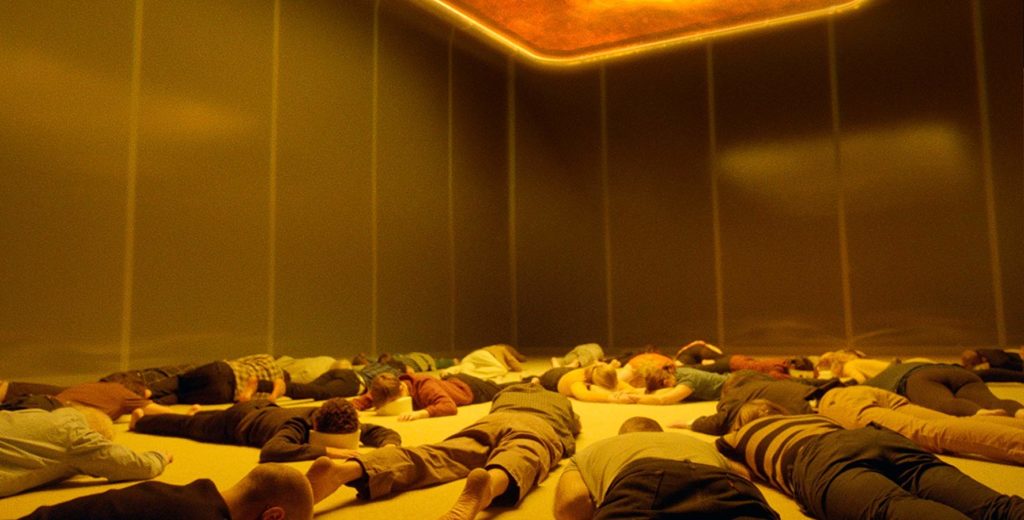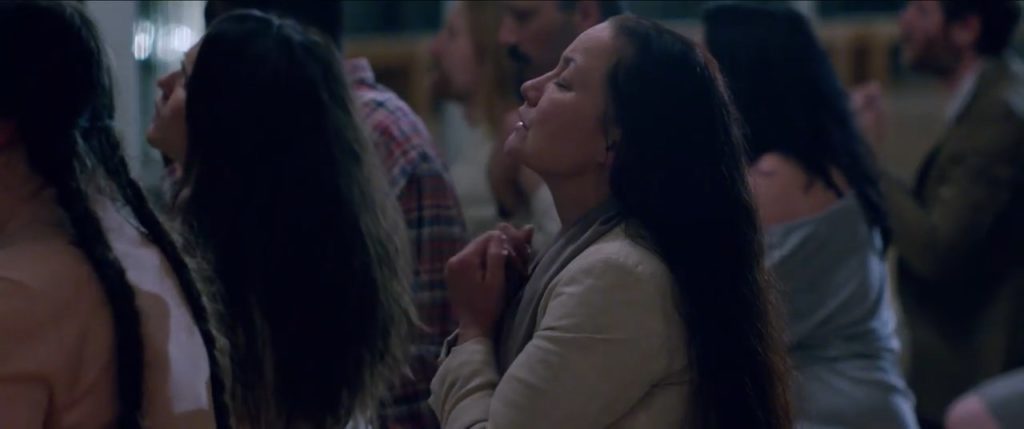Graduates of Stockholm’s Royal Institute of Art and National College of Film & Television respectively, Pella Kågerman and Hugo Lilja have been collaborating since 2009. Aniara, the first film adaptation of the 1956 Swedish sci-fi poem is their first feature.
Aniara follows a passenger spaceship leaving a ravaged Earth behind. An incident throws it off course and sends it drifting indefinitely. The situation causes passengers and crew to slowly succumb to despair. Read Outtake’s full review here.
Some of the answers have been condensed or slightly paraphrased for clarity.

What was the greatest challenge of adapting the poem for film for the very first time?
[they both laugh]Hugo: There were a lot of challenges.
Pella: So many.
Hugo: It’s a poem, so even though the story is basically the same, it’s written in verse. It’s quite the translation to make dramatic scenes of that. Then, of course, it’s hard to deal with such a huge amount of time happening.
Pella: It’s an epos in space, so there’s so much that you can’t show.
Hugo: Yeah, it was hard to make it on a small budget.
Pella: Show him, show him, take off your hat.
Hugo: Yeah, ok. [Hugo takes off his baseball cap and reveals a bald spot near one of his temples]
Pella: We were very stressed. In the end, we did some insert shots in our living room.
Did you film chronologically or…?
Hugo: No, not chronologically at all. We were very dependent on access to the various locations we were making a space ship out of.
Pella: We had to shoot at night, mostly, because the locations were busy in the day time, so we got very tired. Then we had to go on those Scandinavian ferries back and forth. That was kind of a reenactment [of the Aniara]-
Hugo: Method acting.
Pella: Yeah, we were only there a short time, but everyone got so sick of the same food, they got seasick. I think I wrote a note “don’t kill yourself today, do it tomorrow”. It was intense.
Can you tell me a little bit about what you ended up changing from the poem and why?
Hugo: Not that much. The overall story is the same. There were a lot of characters that we sort of mashed up together. The episode with the probe is really, really short in the poem and we expanded on that.
Pella: It might be hard to believe when you watch the movie, but we actually put in a lot of hope that wasn’t in the poem. The poem was even darker. I think the only thing the daughter of the author asked was that it had to end the same way as the poem. Everyone has to die. We pitched this to a famous Hollywood agent at one point and he was kind of happy until we came to the end and he was like ‘Can’t one survive?’
If that wasn’t something that was asked of you, would you have changed the ending?
Hugo: No.
Pella: I mean, maybe. I don’t know.
Hugo: No, I don’t know. That’s not the point of the story.
Pella: We know that the writer at one point wrote a happy ending. It was dismissed early on.
Hugo: In a way, what struck us with the story was the premise of a destroyed Earth – that’s a pretty common theme in sci-fi. But in the end, in a lot of them they find another planet and they build a new society or they have a technological solution. In Aniara, there’s a strong message that if we destroy Earth, there’s no technical solution.

If that happened in real life – Earth was destroyed and there’s a spaceship with survivors out there – do you think it would have worked out? Would it have had a happy ending?
Hugo: I don’t think it would have had a happy ending. I think it might have taken a bit longer.
Pella: What do you mean?
Hugo: It might have taken longer for their society to break down?
Pella [turns to me]: And what do you think?
I guess I’m more optimistic. I’d like to think that there’d be a lot of hardship, but we’d find a way to pull through. You know at the end when [SPOILERS for Aniara] the ship reaches that planet? I’d like to think someone would still be alive to see that.
Pella: The thing is, we’ve been very close to the science on this and with the ship’s speed, it would take 5 million years to get there. The human race is very young, we’ve only been around for, what, 400,000 years? So its-
Very optimistic.
Pella [laughs]: Very optimistic. It’s almost religious.
Hugo: You’re the optimist. You would have been the Mimarobe. [person who operates the Mima, a sentient machine that draws from people’s memory/experience and creates calming visions, usually of nature].
Speaking of the Mima, what do you think it would show you if went into it?
Pella: I’ve been to the archipelago in Stockholm a lot, so I’ll probably see that. Definitely.
Hugo: If it’s nature, I think I’d see the mountains in Sweden.

Arvin Kananian is a Swedish actor and film maker of Iranian descent.
He’s studied Sanford Meisner and Lee Strasberg methods at acting schools in London and Stockholm. He plays Chefone, the captain of the doomed spaceship Aniara.
You play the captain, the leader, the authority figure – in your opinion, did he do a good job?
Arvin: I think, he thinks… no. I don’t think he does either. He probably regrets a lot of things, a lot of choices on a personal level. I believe he still thinks he did what had to be done and that there was no other way
Maybe a little bit of denial and putting a front of ‘everything is fine.’
Arvin: Exactly. I think he believes in the choices he’s made, but on a personal level, he would not have wanted to be so lonely.
If you were a passenger on board the Aniara, how do you think you would have handled the news?
Arvin: [sighs]
It’s a big question.
Arvin: Yeah! Tough. I think I would have, for a while, had a lot of hope. Just be in denial. And then after a while, I’d go for the hedonistic way to die.
So you found Aniara prophetic? You think if we were in that situation, that is how it would go?
Arvin: Maybe. Or maybe I’d find some kind of occupation that I’d liked.
For the captain, you see him a lot in the gym, focusing on these short terms goals and keeping people happy.
Arvin: Yeah, I think he wants to be the best version of himself, so that he can take care of the people. That’s why he works out. He comes from this stringer military background, so he has to be the best he can be.
Were you familiar with the poem before you joined the movie?
Arvin : No, I wasn’t. I was aware of the author. It was generations older than me, they were forced to read Aniara in school. Older people than me, they know all about it. First time I read the poem was after reading the script twice – which actually helped me understand the poem a little better.
When you were building the character, did you refer more to the script or to the poem?
Arvin: The script. In the poem, the captain is described in one page and it’s the darkest thing.
I’ve read that he’s kind of the villain.
Arvin: Yeah, super villain. Super dark. I couldn’t really relate to that. I had to take something out of that darkness, but his choices still had to make sense to me.

The Mima shows people calming visions of nature and Earth beauty. If you were to go in, what do you think it would show you?
M: That’s a good question! I think I’d see skiing. I love to go skiing, it’s my favourite thing in the world, so I’d probably be on the slopes. This is speaking as me, I don’t know what the captain-
We don’t really see him going in the Mima.
Arvin: He would never stoop that low.
Do you think he was a little scared of what the Mima might show him?
Arvin: Absolutely! I don’t think he would be aware, but subconsciously, he’d be scared. The fact that he didn’t go, I think means subconsciously he was really afraid.
The poem was originally written in the 50s and it’s something that we still come back to today and we might again in the future. What piece of advice would you give to the future actor that’s playing the captain?
Arvin: I would probably tell them… whenever your character is in a situation where a little bit of his broken personality can sip through, from like his eyes, or whatever – let it. But then as soon as it’s outside of your body, shut it down. That’s what the captain has to do. Don’t always be stone cold.
ANIARA is released in cinemas and on digital HD from 30th August.
